Dogs
Hey Julie,
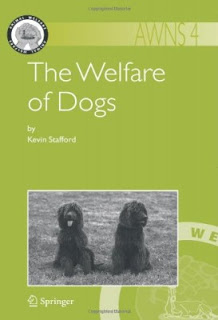
From within Stafford:
What ‘good animal welfare’ refers to may need to wait to be a topic for another day!
Dawkins, M.S. (2008). The Science of Animal Suffering, Ethology, 114 (10) 945. DOI: 10.1111/j.1439-0310.2008.01557.x
Grandin, T. (Ed.) (2010) Improving Animal Welfare: a practical approach, (Book), Cabi; ISBN: 978-1-84593-541-2
Sandøe, P. & Christiansen, S. (2008) Ethics of animal use, (Book), Blackwell Publishing; ISBN: 978-1-4051-5120-7
Stafford, K. (2006). The Welfare of Dogs, (Book), DOI: 10.1007/1-4020-4362-7
© Mia Cobb 2012
- Do You Believe In Dog? One Year Of Believing.
Happy anniversary Julie! Can you believe we've been exchanging blog posts about canine science for one year already? In some ways it's gone so quickly and in others it's hard to remember when we weren't. I was going to do a highlights...
- Rspca Australia Scientific Seminar 2013: Recap
Hi Julie, what a week! Thanks for all that great information about The Sounds of Dogs, that was so interesting. I definitely recognise differences in the way my dogs bark. They have very different vocalisations for "strange person at the door",...
- When Coping Is Not Enough
Hi Julie, Snapshot from Project: Play with your Dog's 'Wall of Contributors'I’m so pleased to hear that Project: Play with Your Dog is going well. I’ve enjoyed watching the wall of contributors grow and it’s awesome that The Bark...
- It's All About Objective Multiples...
sciseekclaimtoken-5036b68d5c7f8 First thoughts...Hey Julie! I hope you had a great weekend. Can I tell you more about assessing welfare? Hell to the yeah I can! (By the way, who gave you that photo of me working at 3:17am?!) I could...
- So Much Dog To Talk About. All The Time In The World!
(source)Hi Mia, Yowzer!! We have so much to talk about! Dogs eating poop, welfare assessment, behavioural needs, enrichment and the “guilty look” are only the beginning! Speaking of which, I’m sure you have at least 7,000 more words...
Dogs
I'll show you mine if you show me yours!
 |
| Yep - that adult (green coat) having more fun than any kid? That's me. |
We had a fun weekend, there were miniature trains involved, so how can that be anything other than fabulous?
I hope you did too!
I hope you did too!
Can I firstly say – !!!! – how awesome is EthoSearch?! Thank you SO MUCH for sharing that with me – I can’t believe I didn’t know about it and will certainly be starting any conversations with new students in my research group with “Hi, I’m Mia, and here is the link for EthoSearch – you’re welcome”. It’s a GREAT resource.
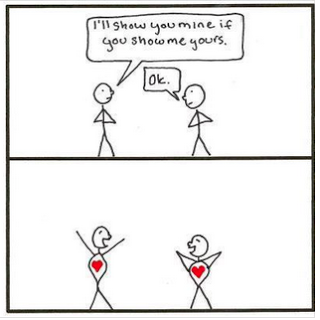 |
| (source) |
So you’d like me to define ‘animal welfare’, would you?
Great question! I’ll show you mine if you show me yours! I’m not sure I have a one line response, but allow me to ‘think out loud’ if you will...
I think it’s fair to say that there’s no single universal definition of ‘animal welfare’.
I think this is partly because our understanding of how and what animals experience is changing over time and partly because different people emphasise different aspects of animal experiences so their 'angle' on/of animal welfare will also differ.
 |
| (source) |
It is a term with its roots in philosophy and ethics and I was lucky enough to share great conversation over dinner with Peter Sandøe earlier this year.
Sandøe trained as a philosopher and is currently a Professor of bioethics in Denmark. You can hear the public lecture (and see the PowerPoint presentation) that he gave in March 2012, titled ‘Animal Welfare – where does science end and ethics begin?’ via the Animal Welfare Science Centre/RSPCA Australia. It’s a fabulous presentation and well worth taking the 45min if this is a topic of interest to you.
When I refer to thoughts about the definition of ‘animal welfare’ used by people who have been working in this field far longer than me, I find:
When I refer to thoughts about the definition of ‘animal welfare’ used by people who have been working in this field far longer than me, I find:
Broom (who, incidentally, I can happily vouch for as a master of the conference dance floor!):
“The welfare of an individual is its state as regards its attempts to cope with its environment”.
- If coping can be achieved easily with little effort and resource, energy and time use – welfare is considered OK.
- If it fails to cope or coping takes much time/energy/resources, then welfare is obviously poor.
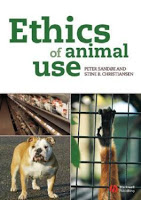 |
| (source) |
From within Sandøe & Christiansen:
- The welfare of a sentient animal is determined by its capacity to avoid suffering and sustain fitness.
- Not only will welfare mean control of pain and suffering, it will also entail nurturing and fulfilment of animals natures.
Dawkins:
"Good welfare is achieved when animals are healthy and have what they want."
"Good welfare is achieved when animals are healthy and have what they want."

From within Stafford:
- The welfare of an animal relates to its subjective experiences of life.
- We can never know the subjective experience of a dog but we can be reasonably sure of its physical condition and can use physiological, behavioural and immunological parameters to give some indication of an animal’s experience of suffering and pleasure.
- The strength of these emotions may be measured using physiological and behavioural parameters that appear to be common to many mammals including humans.
- Interpretation is always subjective.
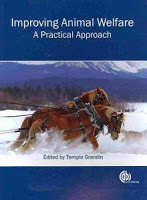 |
| (source) |
From within Grandin:
Despite debates on what animal welfare is, many guidelines and regulations have been created to protect animal’s wellbeing. It’s a little peculiar to imagine rules governing a concept that we, in general, have so much trouble understanding and defining. Some animal welfare concepts and concerns are purely ethical and cannot be completely explained scientifically.
I think many people would anticipate a response to your question along the lines of ‘animal welfare refers to an animal’s physical and mental well-being’. For me this is a little like your example of saying ‘aggression is aggressive because it’s aggression’ – it doesn’t really clarify what is meant. I could also say 'there is no definition, we don't know what we mean by animal welfare'...
I think many people would anticipate a response to your question along the lines of ‘animal welfare refers to an animal’s physical and mental well-being’. For me this is a little like your example of saying ‘aggression is aggressive because it’s aggression’ – it doesn’t really clarify what is meant. I could also say 'there is no definition, we don't know what we mean by animal welfare'...
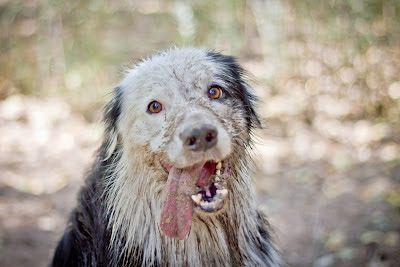 |
| How would you rate this dog's welfare compared to the one below? (source) |
 |
| (source) |
Instead, I think I prefer to say that I understand ‘animal welfare’ as a state of an individual animal which can range from negative to positive and is influenced by its physical, behavioural, environmental and affective experiences. I’m also quite prepared to change this understanding as I continue to learn.
I’m very interested to hear more about the welfare aspects of the work Marc Bekoff touched on in his article last week. Can you tell me a bit more about that?
And remember – I’ve shown you mine, so fair’s fair...
Mia
Referenced:
Broom, D.M. (1986). Indicators of poor welfare, British Veterinary Journal, 142 (6) 526. DOI: 10.1016/0007-1935(86)90109-0And remember – I’ve shown you mine, so fair’s fair...
Mia
Referenced:
Dawkins, M.S. (2008). The Science of Animal Suffering, Ethology, 114 (10) 945. DOI: 10.1111/j.1439-0310.2008.01557.x
Grandin, T. (Ed.) (2010) Improving Animal Welfare: a practical approach, (Book), Cabi; ISBN: 978-1-84593-541-2
Sandøe, P. & Christiansen, S. (2008) Ethics of animal use, (Book), Blackwell Publishing; ISBN: 978-1-4051-5120-7
Stafford, K. (2006). The Welfare of Dogs, (Book), DOI: 10.1007/1-4020-4362-7
© Mia Cobb 2012
- Do You Believe In Dog? One Year Of Believing.
Happy anniversary Julie! Can you believe we've been exchanging blog posts about canine science for one year already? In some ways it's gone so quickly and in others it's hard to remember when we weren't. I was going to do a highlights...
- Rspca Australia Scientific Seminar 2013: Recap
Hi Julie, what a week! Thanks for all that great information about The Sounds of Dogs, that was so interesting. I definitely recognise differences in the way my dogs bark. They have very different vocalisations for "strange person at the door",...
- When Coping Is Not Enough
Hi Julie, Snapshot from Project: Play with your Dog's 'Wall of Contributors'I’m so pleased to hear that Project: Play with Your Dog is going well. I’ve enjoyed watching the wall of contributors grow and it’s awesome that The Bark...
- It's All About Objective Multiples...
sciseekclaimtoken-5036b68d5c7f8 First thoughts...Hey Julie! I hope you had a great weekend. Can I tell you more about assessing welfare? Hell to the yeah I can! (By the way, who gave you that photo of me working at 3:17am?!) I could...
- So Much Dog To Talk About. All The Time In The World!
(source)Hi Mia, Yowzer!! We have so much to talk about! Dogs eating poop, welfare assessment, behavioural needs, enrichment and the “guilty look” are only the beginning! Speaking of which, I’m sure you have at least 7,000 more words...
